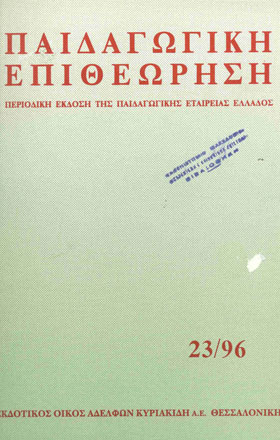Εθνοκεντρισμός και εκπαίδευση: η περίπτωση των Βαλκάνιων λαών και Τούρκων στα ελληνικά σχολικά βιβλία: αφορμή για προβληματισμό και συζήτηση
Main Article Content
Περίληψη
This study aims to investigate the possible ethnic biases and stereotypes regarding Balkan people and the Turks that are containe in the school textbooks of the Greek compulsory education (grades 1-9). The theoretical part of the study garbles with the concepts of ethnicity and ethnocentrism vis a vis the schooling process, especially the curriculum and the school textbooks; several studies are mentioned which indicate that most countries project in their school textbooks their own ethnic tradition and culture as well as an image of other countries and peoples which is often inadequate and distorted. Given that distorted views and negative references and biases of other peoples and cultures in the national curricula and school textbooks do not unite but separate peoples and nations, the authors of this study attempted to explore to which degree Greek textbooks include negative references and biases towards the Balkan countries and the Turks. To this end, a content analysis was conducted in the social studies, religion and language arts textbooks. Thus, a total of 55 textbooks (42 from the elementary and 13 from the gymnasium) were analyzed to attain the following: a) locate the pages in which total ref¬erences exist regarding the Balkan people and the Turks, b) present quantification of the total pages of the textbooks both for the elemen¬tary and the gymnasium level, c) interpretation, evaluation and categorization of all references to "positive", "negative" and "neutral" by grade and level of education. In sum, the results of the content analysis indicated that: 1. the total references (direct and indirect) concerning the Balkan people and the Turks cover an 8,8% in the language, religion and social studies textbooks of the Greek compulsory education. 2. the references in the elementary school level cover a 7,5% of the sum total of language, religion and social studies textbooks, while in the gymnasium the percentage is greater (11,1%). 3. the percentages of negative references are high both in the elementary school textbooks (59,8%) and in those of the gymnasium (69,4%). 4.- of the negative references the greatest percentage concerns the Turks, both in the elementar}' school (91,9%) and in the gymnasium (90,7%) while the rest concern the Bulgarians (8,1%) and (9,3%) respectively. 5.- the percentages of "neutral" (33,5% and 26,8%) and positive (6,6,% and 3,6%) references in the elementary and the gymnasium level respectively are worth noticing. 6.- the negative references (direct and indirect) which mainly con¬cern the Turks, cover a 5,6% out of a total of references (8,8%) which concern the Balkan countries and the Turks in general in the Greek textbooks of the compulsory education level. The present study proposes the principles of peace education and emphasizes that distortion and / or inadequacy of historical events towards and from neighbours and other peoples creates a condition for the students who will acquire untrue knowledge and dangerous views and conceptions of other peoples and cultures.
Article Details
Τεύχος
Ενότητα
Άρθρα
